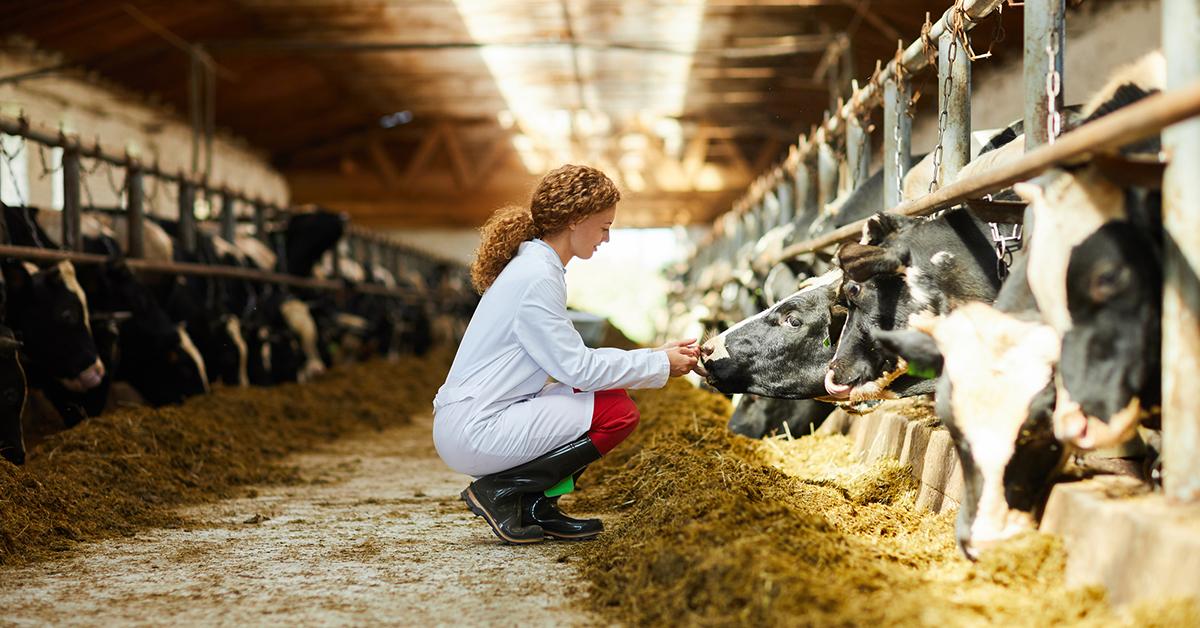Why Does Organic Milk Last So Long?
If you noticed on your most recent run to the grocery store that the expiration date on a jug of organic milk is longer than the expiration date on regular, conventional milk, then you may have some questions.
Updated Dec. 3 2019, 2:39 p.m. ET

If you noticed on your most recent run to the grocery store that the expiration date on a jug of organic milk is longer than the expiration date on regular, conventional milk, then you may have some questions. Why would organic milk expire later if it’s quote-on-quote “fresher” or “healthier” than its conventional counterpart? Why does traditional milk expire so quickly? And most importantly, what is it about the way organic milk is made or treated that makes it last longer?
First, let’s talk about what it actually means for milk to be organic. Nowadays, there are so many varied camps of thinking when it comes to milk and what people (or experts) think is best. With more and more consumers opting for cow milk alternatives such as oat and nut milks — oat milk, almond milk, cashew milk, walnut milk, etc. — it’s no wonder that milk sales have dropped more than $1 billion in the past year. Even with plant-based dairy alternatives taking off, some people prefer to stick to dairy milk. However, it’s totally reasonable you’d want to understand the differences between organic and regular milk.
So, what does it mean for milk to be organic? The term “organic” in milk means a farm does not use antibiotics or hormones on their cows. Farms that produce typical, non-organic milk may use antibiotics to treat or fight infections in their dairy cows. These farms may also dabble in using hormones to increase their cows’ milk production. With organic milk, you can rest assured that hormones and antibiotics are not being used on the cows that produced your milk.
Got burgeoning milk questions? We’ve got answers. Keep reading for a breakdown of organic milk: why it lasts so long, if it’s truly the healthier alternative, and so much more.
Why does organic milk last so long?

Organic milk typically lasts longer than traditional milk, which you likely have noticed when checking out the differences in expiration dates. So, what is it about organic milk that allows it to last longer than the traditional stuff? It actually has nothing to do with the fact that the milk is organic. Say what?!
According to Scientific American, organic milk lasts longer thanks to the process of ultrahigh temperature (UHT) treatment. The ultrahigh temperature treatment is a process of preserving milk in which milk is heated to 280 degrees Fahrenheit for two to four seconds. This process kills any bacteria lurking in the milk, which believe it or not, is actually the key difference in why organic milk takes longer to expire.
Regular milk is generally not treated with UHT. Instead, most regular milk relies on a process called pasteurization as a preservative. However, unlike UHT, pasteurization does not kill off all the bacteria present in the milk. It kills some, sure; if it didn’t, so many of us would be sick. But UHT is significantly more efficient at killing bacteria.
However, regular milk can undergo the UHT process. Generally, though, it doesn’t because UHT treatments change the taste of milk. If you’ve drank UHT-treated organic milk before, you may have noticed a sweeter taste. This is because the UHT burns some of milk’s inherent sugars thanks to a process called caramelization. The process of UHT also reduces the vitamin and protein content of milk, which according to Scientific American, makes it unable to be made into cheese.
How long does organic milk last?
Milk that has been treated by way of pasteurization is generally given an expiration date of four to six days. In comparison, UHT-treated milk does not require refrigeration and can technically sit on store shelves for up to six months.
Why is organic milk treated with UHT?
According to the Northeast Organic Dairy Producers Alliance (NODPA), organic milk requires a longer shelf life since organic items typically have to travel farther to get to store shelves. Organic milk is not readily available all throughout the United States because it isn’t produced everywhere. Traditional milk, on the other hand, is more plentiful. Because organic milk isn’t produced everywhere, it often has to travel to further away places. For this reason, organic milk needs to stand the test of time. Hence UHT treatments.
Is organic milk better or healthier?

Organic milk contains a lower ratio of omega-6 and omega-3 fatty acids than regular milk. This is because cows that feed on grass produce milk with an improved fatty acid profile and higher protein levels. By comparison, cows that eat a diet high in corn produce milk that contains higher omega-6 fatty acids.
“But I thought omega-6 fatty acids were a good thing?” They are, typically. But when you eat too much omega-6 fatty acids and not enough omega-3 fatty acids, you are more at risk for heart disease, cancer, inflammation, and other autoimmune diseases, per NBC News. The key here is not necessarily less omega-6s; it’s just a more appropriate proportion of omega-6’s to omega-3’s, which is what organic milk typically provides.
Is organic milk worth it?
It’s no secret that organic milk comes with a heftier price tag than that of traditional milk. So, is it really worth the splurge? There is no short answer. Only you can decide if organic milk is the better choice for you, your health, and your family’s health. Generally, organic milk is accepted as the healthier option, as it has a more ideal ratio of omega-6 fatty acids to omega-3 fatty acids. Ultimately, the choice is up to you.
If you come to the conclusion that organic milk is not worth paying for, traditional milk still has ample nutritious value. However, you may want to reach for whole milk in lieu of other lower-fat options. Those aforementioned fatty acids are a big part of what makes up milk’s fat content. If you skimp out on the fat content, you’re also denying your body those healthy fatty acids that make milk nutritious.
Is organic milk lactose-free?
Organic milk does not mean dairy-free. For this reason, organic milk may still contain lactose, the sugar in milk that lactose-intolerant people are generally allergic to. Organic milk is therefore not lactose-free, so anyone who cannot eat dairy for dietary purposes (whether lactose-free or vegan) should not drink organic milk expecting it to be sans lactose.
Are organic milk cows treated better?

Sadly, not necessarily. Milk cows that produce “organic milk” are typically fed better. Cows that produce traditional milk generally eat a corn-based diet, while cows that produce organic milk are fed organic feed and grass. It also means that organic farmers must allow these cows unrestricted access to the pasture (“free-range”) and also do not use either antibiotics or hormones on their cows. Based on regulations around the organic label, farmers are only allowed to use antibiotics or hormones in the event a cow becomes sick and must be removed from the cow herd.
Organic cow regulations do not include any language in regard to barring farmers from treating cows cruelly or using inhumane practices to acquire milk. While unrestricted access to the pasture and organic feed all sounds great, organic milk cows aren’t necessarily treated better than other cows in the dairy industry. In fact, according to One Green Planet, organic dairy cows are more susceptible to infection (as they’re religiously milked three times a day by a machine) and the udders can become raw, inducing infection. Additionally, organic cows are expected to churn out 10 times more milk than any cow would naturally.
Organic milk cows are also separated from their young immediately after a calf is born. This can cause emotional distress on both the mother and child. Mother cows in the dairy industry typically don’t even get to feed their own babies their milk; instead, they’re expected to make milk primarily for human consumption only. Both cows can come depressed after being separated.
Cows can also become depressed if they are separated from their herd. Symptoms of cow depression can include hiding in a dark corner, refusing to eat or drink, and even bellowing. A cow’s cortisol level (stress level) dramatically spikes when separated from their friends and family.
Cows that produce organic milk often have to deal with the same unsanitary and cramped conditions that traditional cows do. Yes, despite that “unrestricted access to the pasture.” According to PETA, even dairy cows are often confined to small, unsanitary quarters. Remember, dairy cows are milked three times daily mechanically, so they can’t just be off in a pasture somewhere. Farmers need to constantly check their numbers, too, to make sure they have enough cows to produce enough milk.
So, no, cows that produce organic milk are generally not treated much better than cows that produce traditional milk. And, of course, one of the best things you can do for these cows and the planet is opt for the dairy-free options.